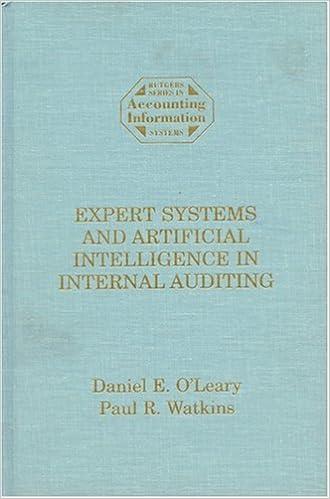Question
Our coverage focuses on accounting for leases and income taxes. Particularly, lease obligations have often been associated with a practice called off-balance-sheet financing, and income
Our coverage focuses on accounting for leases and income taxes. Particularly, lease obligations have often been associated with a practice called off-balance-sheet financing, and income taxes and their related assets and liabilities can also greatly impact the financial statements. Please post your comments and feedback on this week's materials.
Consider how leases impact the balance sheet and income statement. Is a lease liability reported? Is a lease asset reported? Do these balance sheet components have associated costs (matching principle)? What if the lease has no balance sheet impact?
Accounting for income taxes is complex. Tax authority rules cover reporting for tax purposes. Instead, our course is based in GAAP accrual accounting principles, which cover reporting for financial accounting purposes. Companies set up two different systems to produce necessary reports. Different rules produce different results. For our class, we will learn about those differences that are temporary because amounts related to the differences are reported on the GAAP financial statements as deferred tax assets and liabilities. DTAs result from temporary differences that will reduce taxes paid in the future, and DTLs result from temporary differences that will increase taxes paid in the future.
One of the main temporary differences between financial accounting reporting principles and tax reporting rules that results in deferred tax consequences is related to the revenue recognition/matching principles leading to different recognition outcomes than those prescribed by the tax rules. So, understanding accruals and deferrals is absolutely crucial in this context. The other temporary differences that can lead to deferred tax assets and liabilities are depreciation differences (these are deferred expenses, but they are deferred differently under tax rules) and tax loss carryforwards (which are different because losses are not carried forward to the next period's income statement under financial accounting).
The most recent IRS tax reform obviously reduces taxes paid by businesses, but how do you think it impacts financial reporting under GAAP? One thing to consider is that deferred tax balance sheet amounts are calculated using the expected tax rates from the periods in which the differences will reverse in the future.
Step by Step Solution
There are 3 Steps involved in it
Step: 1

Get Instant Access to Expert-Tailored Solutions
See step-by-step solutions with expert insights and AI powered tools for academic success
Step: 2

Step: 3

Ace Your Homework with AI
Get the answers you need in no time with our AI-driven, step-by-step assistance
Get Started


